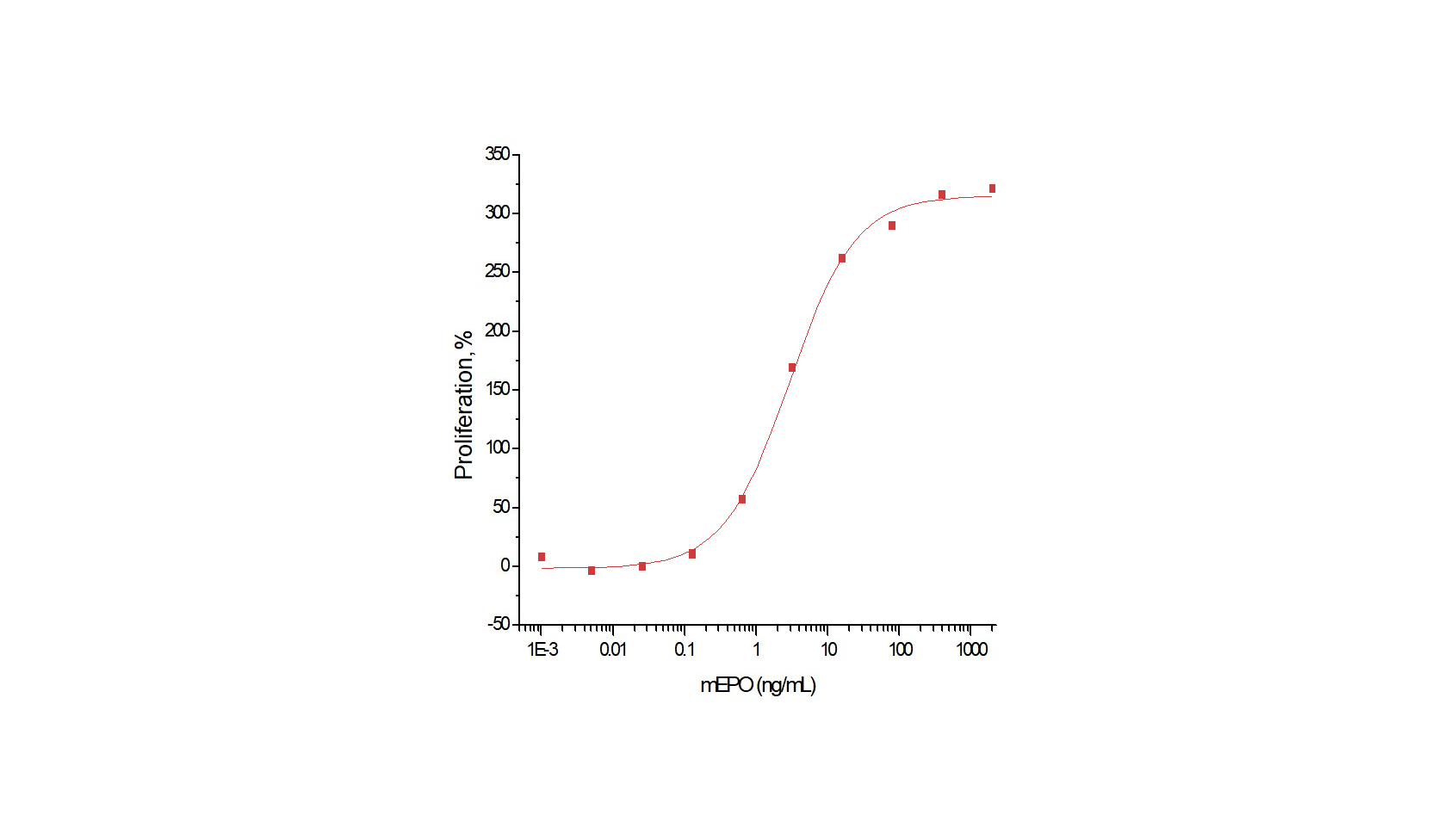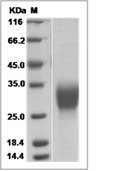Shopping Cart
- Remove All
 Your shopping cart is currently empty
Your shopping cart is currently empty

EPO/Erythropoietin Protein, Mouse, Recombinant is expressed in HEK293 mammalian cells. The predicted molecular weight is 18.6 kDa and the accession number is P07321.

| Pack Size | Price | Availability | Quantity |
|---|---|---|---|
| 20 μg | $358 | In Stock | |
| 100 μg | $1,230 | 7-10 days | |
| 200 μg | $2,090 | 7-10 days |
| Biological Activity | Measured in a cell proliferation assay using TF-1 human erythroleukemic cells. The ED50 for this effect is typically 2-10 ng/mL.  |
| Description | EPO/Erythropoietin Protein, Mouse, Recombinant is expressed in HEK293 mammalian cells. The predicted molecular weight is 18.6 kDa and the accession number is P07321. |
| Species | Mouse |
| Expression System | HEK293 Cells |
| Tag | Tag Free |
| Accession Number | P07321 |
| Synonyms | erythropoietin |
| Construction | A DNA sequence encoding the mouse Epo (NP_031968.1) (Met1-Arg192) was expressed. Predicted N terminal: Ala 27 |
| Protein Purity | > 95 % as determined by SDS-PAGE.  |
| Molecular Weight | 18.6 kDa (predicted) |
| Endotoxin | < 1.0 EU/μg of the protein as determined by the LAL method. |
| Formulation | Lyophilized from a solution filtered through a 0.22 μm filter, containing PBS, pH 7.4. Typically, a mixture containing 5% to 8% trehalose, mannitol, and 0.01% Tween 80 is incorporated as a protective agent before lyophilization. |
| Reconstitution | A Certificate of Analysis (CoA) containing reconstitution instructions is included with the products. Please refer to the CoA for detailed information. |
| Stability & Storage | It is recommended to store recombinant proteins at -20°C to -80°C for future use. Lyophilized powders can be stably stored for over 12 months, while liquid products can be stored for 6-12 months at -80°C. For reconstituted protein solutions, the solution can be stored at -20°C to -80°C for at least 3 months. Please avoid multiple freeze-thaw cycles and store products in aliquots. |
| Shipping | In general, Lyophilized powders are shipping with blue ice. |
| Research Background | Erythropoietin is a member of the EPO / TPO family. It is a secreted, glycosylated cytokine composed of four alpha helical bundles. Erythropoietin can be found in the plasma and regulates red cell production by promoting erythroid differentiation and initiating hemoglobin synthesis. It also has neuroprotective activity against a variety of potential brain injuries and antiapoptotic functions in several tissue types. Erythropoietin is the principal hormone involved in the regulation of erythrocyte differentiation and the maintenance of a physiological level of circulating erythrocyte mass. It is produced by kidney or liver of adult mammals and by liver of fetal or neonatal mammals. Genetic variation in erythropoietin is associated with susceptbility to microvascular complications of diabetes type 2. These are pathological conditions that develop in numerous tissues and organs as a consequence of diabetes mellitus. They include diabetic retinopathy, diabetic nephropathy leading to end-stage renal disease, and diabetic neuropathy. Diabetic retinopathy remains the major cause of new-onset blindness among diabetic adults. It is characterized by vascular permeability and increased tissue ischemia and angiogenesis. It has a longer circulating half-life in vivo. Erythropoietin is being much misused as a performance-enhancing drug in endurance athletes. |

Copyright © 2015-2025 TargetMol Chemicals Inc. All Rights Reserved.